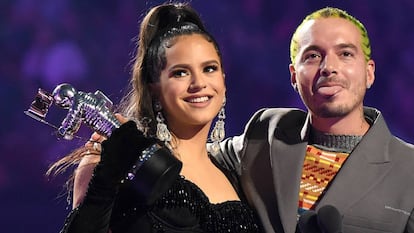Rosalía becomes first female Spanish artist to win an MTV Video Music Award
The 25-year-old star from Catalonia won Best Latin Video alongside reggaeton artist J Balvin for their song ‘Con Altura’

After two hours of the 36th edition of the MTV Video Music Awards last night, it was time for a song in Spanish. The 20,000 attendees of the event in New Jersey were silent as a flamenco voice sang out. Rosalía, dressed all in black, lit up the Prudential Center. Last night the 25-year-old, who is from Catalonia, became the first female Spanish artist to have received a prize at the event. In 2001, Spain’s Alejandro Sanz took the MTV Latin America International Viewer’s Choice award for for the video for his song El Alma al Aire.
Rosalía came up onto the stage, accompanied by J Balvin, to receive an award for the Best Latin Video for the song Con Altura. “I come from Barcelona,” she said after collecting the prize. “Thank you for inviting me to sing on this stage in Spanish.”
Taylor Swift was in charge of opening the night, and taking the audience on a voyage that MTV wanted to be a magical one. And in part, it was. The pop superstar sang You Need to Calm Down on a stage that looked like the stomach of a unicorn, while Rosalía and Camila Cabello danced along. The magic continued to flow when hip-hop legend Missy Elliot sang through a compilation of her hits as rain fell from the ceiling, volcanoes spit out lava and a spaceship landed on the stage.
Praise from the US
Earlier this week, Rosalía was also in the headlines after former US President Barack Obama published on Twitter a list of songs that he and his wife Michelle had been listening to over the summer. Among them, at number 31, was Con Altura, the same song that won Rosalía and J Balvin their prize at last night’s MTV awards. It was not the first time that the Obamas had put a Spanish artist on their summer playlists. In 2015, they included Tengo un trato by La Mala Rodríguez.
In May of this year, Con Altura was named one of the 10 best songs of the year so far by the prestigious US magazine Time. While the reggaeton-influenced collaboration was not to all of her fans’ tastes, the song won the admiration of the publication, praising her for proving herself “chameleonic during her swift ascent over the last year,” having handled “James Blake ballads, voluptuous dancehall anthems and mournful Justin Timberlake interpolations with equal aplomb.” As for the song, Time said it sounded like “dembow, hip-hop and flamenco, with middle eastern influences sprinkled in,” concluding that it “sounds like the future of global pop music.”
English version by Simon Hunter.
Tu suscripción se está usando en otro dispositivo
¿Quieres añadir otro usuario a tu suscripción?
Si continúas leyendo en este dispositivo, no se podrá leer en el otro.
FlechaTu suscripción se está usando en otro dispositivo y solo puedes acceder a EL PAÍS desde un dispositivo a la vez.
Si quieres compartir tu cuenta, cambia tu suscripción a la modalidad Premium, así podrás añadir otro usuario. Cada uno accederá con su propia cuenta de email, lo que os permitirá personalizar vuestra experiencia en EL PAÍS.
¿Tienes una suscripción de empresa? Accede aquí para contratar más cuentas.
En el caso de no saber quién está usando tu cuenta, te recomendamos cambiar tu contraseña aquí.
Si decides continuar compartiendo tu cuenta, este mensaje se mostrará en tu dispositivo y en el de la otra persona que está usando tu cuenta de forma indefinida, afectando a tu experiencia de lectura. Puedes consultar aquí los términos y condiciones de la suscripción digital.








































